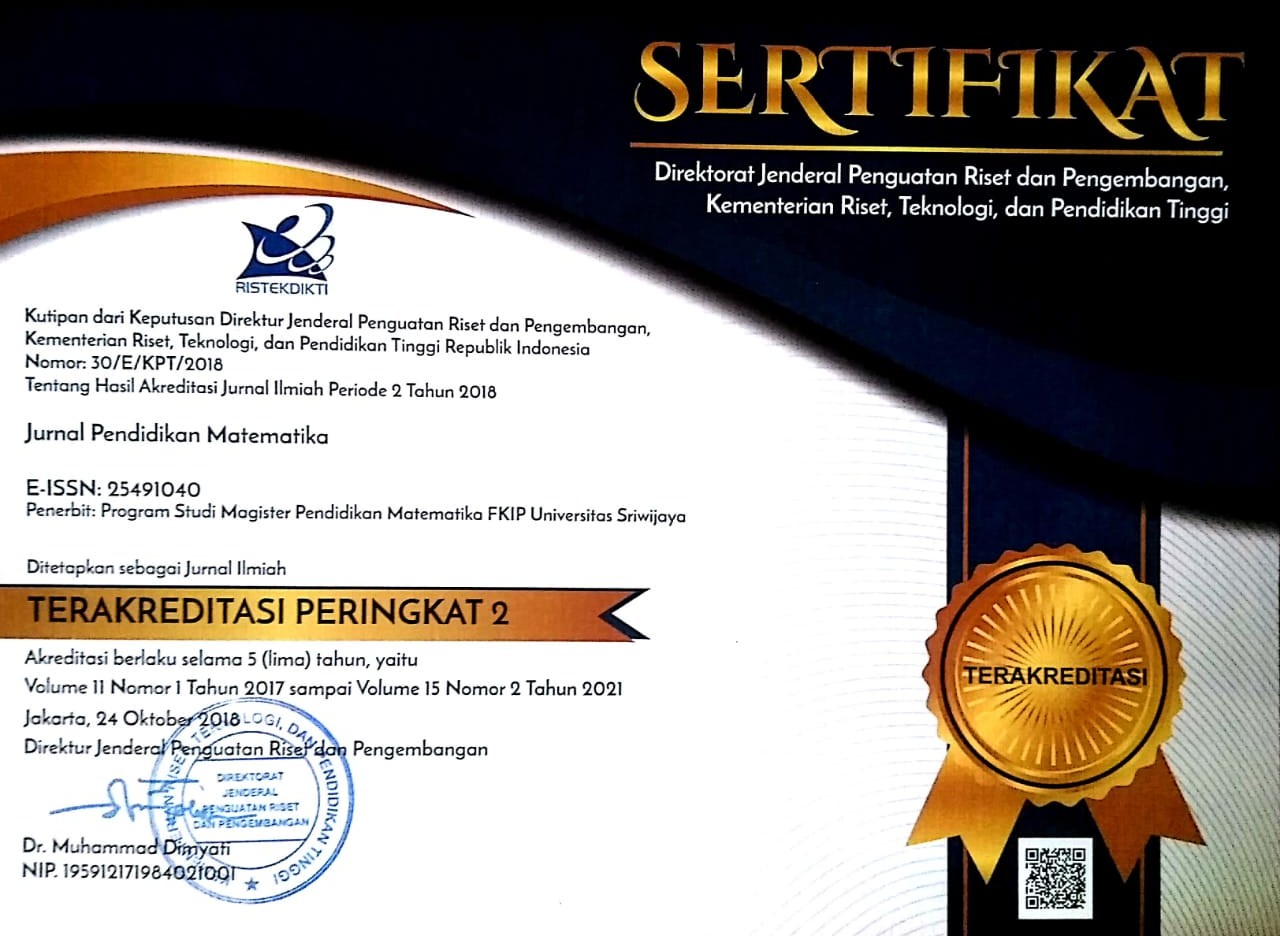Once the initial proof has been corrected and finalized, the article is ready for Online First publication. The article will be forwarded for online publication on OJS JPM's link in a month's time after the receipt of corrections. All issue files undergo a final quality check. In the next step the printer PDFs are created. The HTML, online PDF and metadata files are archived in JPM’s database and published via OJS JPM's link including the DOI.
Please note:
After the article's online publication on OJS JPM's link, no corrections (including the order of the authors' names) can be made. Changes can only be made in the form of an Erratum, which will be hyperlinked to the article.
Table of Contents
Articles
PERAN GURU DALAM MERANCANG PEMBELAJARAN MATEMATIKA MELALUI LSLC
|
Anggi Arini, Ratu Ilma Indra Putri |
|
|
Abstract Penelitian ini bertujuan untuk menjelaskan peran kolaboratif guru dalam merancang kegiatan pembelajaran penjumlahan dan pengurangan bilangan bulat melalui lesson study bagi siswa.Subjek penelitian ini adalah siswa kelas VII di SMP 1 Palembang.Jenis penelitian ini adalah deskriptif kuantitatif dengan metode survei. Data diperoleh melalui observasi dan dokumentasi.Analisis data menggunakan studi kualitatif untuk menjelaskan peran guru matematika dalam merancang pembelajaran penjumlahan dan pengurangan bilangan bulat melalu itahapan-tahapan yang terdapat pada LSLC. Ada empat langkah dalam penelitian ini yaitu guru merencanakan, melakukan, merefleksikan dan mendesain ulang. Pada pertemuan pertama dengan guru matematika SMP 1 Palembang di tahap perencanaan, ada beberapa masalah seperti tidak semua guru ingin melakukan lesson study di kelas mereka, sulit untuk menemukan waktu yang tepat untuk melakukan “rencana” karena guru matematika cukup banyak jam kelas, dan ketakutan guru untuk menjadi pemain peran dalam lesson study. Selain itu Lesson Study memberikan peranan penting dalam merancang kegiatan pembelajaran sebab dalam proses perancangan yang dilakukan bersama-sama, guru berperan sebagai fasilitator dan mediator untuk membuat skenario proses berlangsungnya kegiatan pembelajaran yang membantu proses belajar siswa menjadi lebih efektif. Keywords Lesson Study, Collaborative, Penjumlahan dan Pengurangan Bilangan Bulat.
|
|
DEVELOPMENT OF PISA-TYPE MATH PROBLEMS USING COCONUT CONTEXT
|
Amelia Utari, Zulkardi |
|
|
Abstract The purpose of this study isto produce PISA-type maths problemsusing coconut as the context and to assess the potential effects of PISA-type maths problems on mathematics literacy skills in first-grade students of SMK Negeri 1 Palembang. The method used is design research type of development study, thatis consisting of two stages namely the preliminary and formative evaluation stages. At premilinary stage, the subjects of the study, curriculum, PISA framework were analyzed and the instrumental questions were developed. While the formative evaluation phase are including self-evaluation, expert reviews, and one-to-one, small group, field tests. Data collection techniques used among others are walkthrough, document review, observations, interviews, and tests. The research resulted in PISA-type questionsusing the contexts of coconut plantsthat are valid and practical. The validityis assessed using the results of validator's assessment in terms of content, construction, and language as well as the workmanship of students in one-to-onestage. Furthermore, the practicality isconfirmed bythe workmanship of students in the small group stage where they are able to understand the inquiry of the problem as shown in the students' answers at field test stage. The questions raises 6 mathematical literacy abilities. The most dominant abilities that are developed are including reasoning and communication skill. Keywords Design Research, Mathematical Literacy, PISA
|
|
DEVELOPMENT OF PISA TYPE MATH PROBLEMS USING FINANCIAL CONTEXT
|
Gold Dayona, Zulkardi |
|
|
Abstract Since the PISA (Programme for International Student Assesment) type math problems have been significantly developed by researchers, many researchers had developed interesting PISA type math problems using contexts that are useful in everyday life. In line with this, we developed a PISA type math problem using a financial context. The purpose of this research is to analyze (1) the characteristics of a valid and practical PISA-type math question in financial contexts? (2) the potential effects on students of PISA-type math problems offinancial context? Questions are designed based on PISA framework, that are adapted to the 2013 curriculum used at SMA Srijaya Negara Palembang, and by paying attention to mathematical literacy skills of the students with regard to the PISA. The method being used is design research type of development study. The results of the research is 8 math questions of PISA type that are valid and practical, and has a potential effect on students assessed based on the level of mathematical literacy of the students, including communication, mathematising, representation, reasoning and arguments, and ability to use mathematical tools. Keywords Development, PISA Type Math Problems, Financial
|
|
DEVELOPMENT PISA-TYPE MATH PROBLEMS USING CONTEXT OF JAKABARING SPORT CITY (JSC)
|
Osi Mitari, Zulkardi |
|
|
Abstract Since higher order thinking problems became a necessity in training for students’ skill, many researchers developed PISA type math problems. The attempt was made in order to overcome low literacy skills by giving PISA type math problems routinely. The aim of this study was to produce valid and practical mathematics problems and potential effects as used PISA by engaging context of Jakabaring Sport City on tenth-grade students’ mathematical literacy capability of senior high school. The method used in this study was design research type of development study of two stages: preliminary and formative evaluation. Data collection techniques used in this research was walkthrough, documentation, field test, and observation. The math problems produced in this study has been validaty by validator assessment in term of content, construction, and language also by one-to-one stage for task comprehension. Practicality of the task has been measured in small group stage which supports students in understanding the problems. According to 34 students’ responses in field test, data analysis revealed that questions asked have potential effect in improving communication ability, reasoning and argument ability, choose strategies to problem solvinf ability, use language and symbolic, formal and technical operation ability. Keywords Design Research, Mathematical Literacy, PISA, PMRI
|
|
DEVELOPMENT OF PISA TYPE MATH PROBLEMS USING PALEMBANG LIGHT RAIL TRANSIT (LRT) CONTEXT
|
Suci Hardianti, Zulkardi |
|
|
Abstract Since math problems requiring reasoning skills were included in the National Examination (UN), many researchers had developed PISA-type math problems. This was part of the attempts to gradually adjust Indonesian standards to international standards such as PISA. The purpose of this research were (1) to produce PISA-type math problems in Light Rail Transit (LRT) context that are valid and practical (2) to assess the potential effects of PISA-type math problem in Light Rail Transit (LRT) context that have been developed on math literacy skills of tenth-grade senior high school students. The method used in this research was design research type of development study with two stages, namely the preliminary and formative evaluation. The preliminary stage consists of analysis on students, curiculum, context, PISA questions and the design of problems. Formative evaluation consist of self evaluation, expert review, one-to-one, small group and field test. This research produced nine PISA-type math problems in Light Rail Transit (LRT) context that are valid and practical. The validity was confirmed by result of expert review and one-to-one stage. In addition, The practicality was indicated by the ease of students in understanding the problem during the small group stage. The produced questions have succeeded in bringing up 6 mathematical literacy skills in the field test. Out of the six abilities, communication ability is the most dominant. Keywords Design Research, Math Literacy, PISA Problems, LRT
|
|



